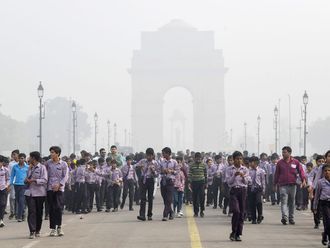New Delhi: Even as India talks of women's empowerment at several podiums, there are many areas that require loopholes to be filled.
A report entitled Progress of the World's Women: In Pursuit of Justice observes women's representation in the justice system thus: "India significantly lags behind the rest of the world."
The report states that only three per cent of the judicial system consists of women. Not only are women judges under-represented in most courts of the country, experts say, parents discourage girls from law courses.
Eminent Supreme Court lawyer and former law minister Ram Jethmalani agrees saying, "Even in the US, which has always believed in gender equality, people did not allow women to take up law. It was somewhere around the end of the 19th century that they made their way to the courts. In fact, a judge delivered a judgment justifying it. He said, ‘Brilliant light of the law is not for tender leaves'.
"Even in India, traditionally, women did not fancy the legal profession. It's only a later development that they have joined the profession in great numbers and outlook of the parents has begun to change. But if one looks at the population figures of women, which is more than 50 per cent in the country, their representation in judiciary is certainly meagre."
The veteran lawyer though claims there is no discrimination of any kind against them. "On the contrary, they are regarded with great favour. And since, from the point of view of integrity and character women are superior to men, we do our best to get any woman judge of the High Court, who has done a good job, to invite her to the Supreme Court," he said. Currently there are only two women and 24 men as judges in the Supreme Court.
Justice M. Fatima Beevi was the first woman judge to be appointed to the Supreme Court in 1989 and was the first Muslim woman to be appointed to any higher judiciary. Similarly, Justice Leila Seth was the first woman judge of the Delhi High Court who went on to become the first Chief Justice of Himachal Pradesh High Court.
Prominent names
Though other prominent names that come to mind include Indira Jaisingh, Rani Jethmalani, Indu Malhotra, Mukta Gupta and Kamini Lau, many others are known to have left the profession after marriage or at the insistence of their families.
Says Seema Chandok: "I had barely completed my law course than my parents insisted on getting me married and my in-laws were not at all keen on the profession. I had no choice, but to quit, as I had four younger siblings and unsupportive parents. Today when I look at women lawyers, I feel so shallow."
Nonetheless, she has made up her mind to see her young daughter fulfil her dream of becoming a lawyer some day.
Chandok further said: "Some years ago, a Public Interest Litigation was filed to open up creches for children of women lawyers in the high court, but no one took notice and nothing happened. Since women have to leave their jobs after having children, the idea was to help them retain their jobs with a creche for their children. But then the deciding factor here also are men."
Law student Aparna Behl agreed that many parents dissuade girls from taking up law because it might reduce their prospects of marriage, as a lawyer is seen as a threat.
But Pratiti thinks differently. Daughter of a senior high court lawyer, she says: "Trends have changed and lot of girls are joining the profession these days. People have different perceptions and some might feel women can be a threat to the prospective in-laws. But my parents are extremely supportive."
Having done her Masters in banking, corporate and finance law she not only finds time to assist her father, but also takes up cases on her own.
Male domination
Speaking on condition of anonymity, another woman lawyer asked: "Hasn't anyone wondered why though the percentage of women lawyers doing well is more than their male counterparts, the promotion list is always full of males?
"Gender bias is something that women discuss often and it exists. One can see the records of the last few decades and know how many women have risen in position. But then to rise, women are required to please both politicians and judges."












